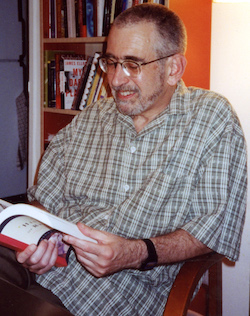Jonathan Goldberg, a dear friend of Eve Kosofsky Sedgwick, passed away on December 9th following a long illness. As detailed in his obituary, published on Sunday, December 18, in the New York Times, Goldberg was a highly influential and prolific scholar working in “the fields of early modern British literature, poststructuralist literary studies, and LGBTQ studies and queer theory.” Among his many other accomplishments, Goldberg made invaluable contributions to the dissemination and evaluation of Sedgwick’s work.
When Sedgwick came to Duke University in 1988, Goldberg was on the faculty of Johns Hopkins University, but he was coming frequently to Duke to visit his partner, Michael Moon, who had joined the Duke faculty the year before. Sedgwick soon became close friends with both Moon and Goldberg. They learned from each other’s work and together participated in creating and editing Series Q at the Duke University Press, which describes the series as having brought “a theoretical and interdisciplinary lens to gay and lesbian studies, approaching questions of sexuality from a queer angle.”
Their friendship continued after Sedgwick moved to the Graduate Center of the City University of New York, while Moon and Goldberg moved to Emory University. When Sedgwick’s own illness became incurable, she asked Goldberg to be her literary executor. Following her death in 2009, Goldberg undertook the difficult task of editing her more recent unpublished manuscripts, some of which existed in multiple versions, into a coherent volume of essays (The Weather in Proust, Duke University Press, 2011). He also contributed an essay of his own to a recent collection of essays about Sedgwick’s work (Reading Sedgwick, edited by Lauren Berlant, Duke University Press, 2019). One of his last projects was a monograph assessing the critical response, following her death, to Sedgwick’s work (Come As You Are, After Eve Kosofsky Sedgwick, punctum books, 2021); this book also contains a previously unpublished talk of Sedgwick’s, “Come As You Are,” which Goldberg describes as representing “a significant bridge between her earlier and later work, sharing with her book Tendencies the ambition to discover the ‘something’ that makes queer inextinguishable.”
